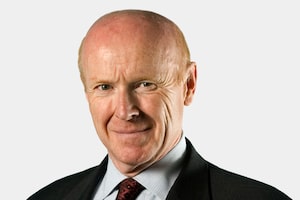In markets such as we've seen over the past while, even the most disciplined investors find it challenging to stay calm.
"That's made even more difficult by the fact that we're wired to act irrationally," says Duke University economist Dan Ariely, author of The New York Times best-seller Predictably Irrational - The Hidden Forces That Shape Our Decisions.
Prof. Ariely kicked off the recent annual meeting of the CFA Institute in Boston, attended by 3,000 investment professionals from around the world, and I had the chance to sit down with him ahead of the event.
The concentration trap
To prove a point to his audiences, Prof. Ariely uses a video of six students passing a basketball - before it starts, the audience is told to count the number of passes.
Cat:e528746c-3414-401a-b14b-50247e3bdf01Forum:d0fa4e14-88d2-41f9-8a19-896bdff9544b
After a minute, people are asked how many passes they'd seen. Once that count is in, the audience is asked whether they'd seen the gorilla.
In watching the video, most viewers had been so busy counting passes they'd missed an actor in a gorilla costume who walked through the middle of the players and beat his chest. (Search for "gorilla basketball experiment" to watch the video online.)
Many investors focus on just one thing at a time - in markets such as today's, it's easy to get fixated on problems in Greece and miss other things that are much more important.
The power of defaults
Prof. Ariely also talks about a puzzling phenomenon when it comes to organ donations: Countries with similar cultures can have organ donations that range from 20 per cent to 80 per cent - Germany and Austria for example, or Sweden and Denmark.
The answer lies in how the choice to donate organs is structured. High-donation countries have a negative default system - you have to check a box not to donate your organs. Low-donation countries (for example Canada) take a positive option approach: you have to check a box to donate organs.
There's an entire new field called choice architecture, devoted to structuring decisions in ways that encourage positive outcomes.
When it comes to investing, Prof. Ariely believes that many investors would be well served with default structures such as regular investments taken from paycheques and automatic rebalancing of portfolios, so that positive long-term behaviour happens automatically.
Overcoming our emotions
Emotions are an incredibly powerful force, the enemy of rational decision-making, Prof. Ariely says. Our emotions lead us to value short-term rewards more than long-term outcomes, often resulting in poor decisions on diet, exercise and spending rather than saving.
In an experiment, people were asked to choose half a box of Godiva chocolates immediately or a full box in a week. A remarkable number chose the half box, unable to resist the immediate reward of those chocolates.
When asked if they'd choose half a box of chocolates in a year or a full box in a year and a week, almost everyone opts to wait. The delay in gratification is the same week - but now our need to be patient is deferred to the future, so our emotional response doesn't kick in.
Prof. Ariely points out that there are strategies that can help overcome emotions.
One is to delay our decisions - emotions are fleeting, so often waiting a few hours or a few days can lead to better decisions.
Another approach is to build in short-term rewards on the way to long-term payoffs - a dinner out if we meet our goals for dieting or exercise for the week, or a long weekend away if we meet our savings goals for a quarter.
A third strategy is to consult with someone we trust before making impulsive decisions, whether it be on shopping or investing.
The perils of complexity
Prof. Ariely finished up his talk at the conference with research indicating that the more complex a decision, the more we fall back on simplistic solutions.
A research study with Canadian doctors asked them to imagine a scenario in which a patient was scheduled for a hip replacement and they discovered they'd forgotten to try a common medication that might make the operation unnecessary. Faced with that decision, the large majority would postpone the surgery to try the medication first - after all the surgery is costly, painful and comes with risks.
Then a different group of doctors was presented with the same scenario - but this time they'd failed to try two medications rather than one. In this situation, many more doctors said they'd go ahead with the surgery, even though there were twice as many options that might make it unnecessary. Adding complexity pushes us to easy choices - whether it be the default of going ahead with the surgery in this experiment or reverting to safe solutions like GICs and cash in turbulent markets.
Taking all his lessons together, Prof. Ariely's message is clear: The starting point for making better decisions is an awareness of the impulse to act irrationally.
For investors, these traps are real and you need explicit strategies to overcome them.
 Dan Richards
Dan Richards